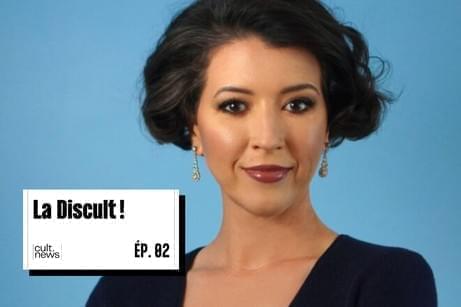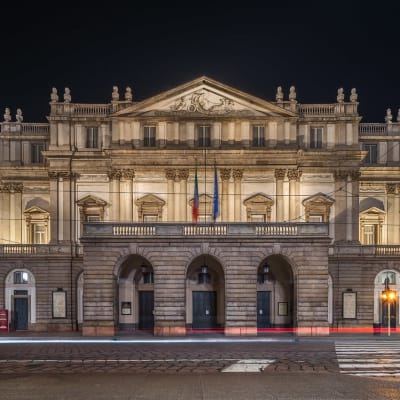Lisette Oropesa and Benjamin Bernheim in concert
About
Lisette Oropesa and Benjamin Bernheim sing duets in a concert with the Orchestra dell'Accademia Teatro alla Scala. With selections from Gounod, Meyerbeer, Massenet and Rossini. Full concert repertoire to be released at a later date.
Program
Giuseppe Verdi (1813-1901)
Ouvertüre (Sinfonia) aus „La Forza del Destino“
Gaetano Donizetti (1797-1848)
Caro elisir! sei mio!
Una furtiva lagrima
Arien des Nemorino aus „L’Elisir d’Amore“
Giuseppe Verdi
Tu del mio Carlo al seno
Arie der Amalia aus „I Masnadieri“
Ouvertüre aus „I Masnadieri“
Signor né principe… Addio, addio
Duett Gilda/Duca di Mantua aus „Rigoletto“
Pause
Charles Gounod (1818-1893)
Ange adorable
Duett Roméo/Juliette aus „Roméo et Juliette“
Ah! je ris de me voir si belle
Juwelenarie Marguerites aus „Faust“
Georges Bizet (1838-1875)
Je crois entendre encore
Arie des Nadir aus „Les Pêcheurs de perles“
Charles Gounod
Ouvertüre aus „Roméo et Juliette“
Giacomo Meyerbeer (1791-1864)
Robert, toi que j’aime…
Arie der Isabelle aus „Robert le Diable“
Jules Massenet (1842-1912)
Ah! fuyez, douce image
Arie des Chevalier des Grieaux aus „Manon“

Interview - Le Discult
Lisette is interviewed by Denis Peyrat in the Cult News program La Discult!

🌷 Spring 2024 Newsletter
🌷 Spring 2024 Newsletter
Reviews
Oropesa e Bernheim alla Scala: quando la classe è doppia
Singolarmente la Oropesa ha giocato le sue carte migliori nell’aria dai Masnadieri (opera con cui aveva fatto il suo fortunato debutto nella sala del Piermarini), come nell’aria dei gioielli del Faust, in cui ha fatto valere tutta la sua souplesse virtuosistica come i trilli granitissimi, per guadagnarsi poi il massimo successo nella struggente “Robert, toi que j’aime” dal Robert le Diable di Meyerbeer, magistralmente risolta con una levigatezza d’emissione, una fantasia nelle mezzevoci e nei pianissimi, una cadenza spettacolare per arditezza strumentale e precisione davvero superlative.Singularly, Oropesa played her best cards in the aria from I Masnadieri (an opera with which she had made her successful debut at the Piermarini theater), as well as in the Jewel Song from Faust, where she showcased her virtuosic suppleness like her incredibly solid trills, earning her the highest success in the poignant "Robert, toi que j’aime" from Meyerbeer's Robert le Diable. She masterfully delivered this with a smoothness of voice, a creative use of half voice and whispers, and a spectacular cadenza known for its daring instrumental boldness and truly superior precision.— Davide Annachini • DelTeatro
Milano, Teatro alla Scala – Concerto di Lisette Oropesa e Benjamin Bernheim
Il succitato duetto ha consentito alla brava Lisette Oropesa di scaldare la voce prima di affrontare la difficile aria dei verdiani Masnadieri, durante la cabaletta della quale abbiamo potuto apprezzare il bellissimo trillo della cantante statunitense e i suoi affascinante acuti, se presi in pianissimo. Dopo l’esecuzione della Sinfonia tratta dalla stessa opera (che ha guadagnato calorose ovazioni al violoncello solista) si è passati all’impegnativo duetto del Rigoletto fra Gilda e il Duca durante il quale la voce del soprano, così ricca di armonici, si fondeva un poco a fatica con quella tendenzialmente frigida del tenore. Seconda parte del concerto tutta dedicata alla Francia, dove una Oropesa tecnicamente pregevole, ma stranamente priva di coquetterie, ha eseguito l’aria “des bijoux” dal Faust di Gounod e il perigliosissimo “Robert, toi que j’aime” da Robert le Diable di Meyerbeer.The aforementioned duet allowed the talented Lisette Oropesa to warm up her voice before tackling the challenging aria from Verdi's Masnadieri, during the cabaletta of which we were able to appreciate the beautiful trill of the American singer and her fascinating high notes, if taken in pianissimo. Following the performance of the Symphony from the same opera (which garnered warm ovations for the solo cellist), they moved on to the demanding duet from Rigoletto between Gilda and the Duke, during which the soprano's voice, so rich in harmonics, somewhat struggled to blend with the inherently cold tenor. The second part of the concert was entirely dedicated to France, where a technically excellent Oropesa, oddly lacking in coquettishness, performed "des bijoux" aria from Gounod's Faust and the extremely risky "Robert, toi que j'aime" from Meyerbeer's Robert le Diable.— Giancarlo Arnaboldi • Conessi all'Opera


